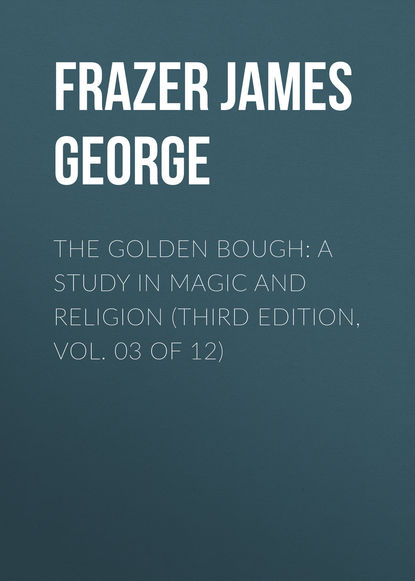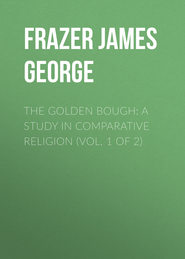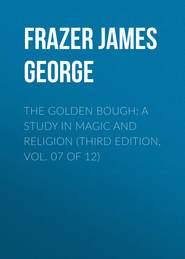По всем вопросам обращайтесь на: info@litportal.ru
(©) 2003-2024.
✖
The Golden Bough: A Study in Magic and Religion (Third Edition, Vol. 03 of 12)
Настройки чтения
Размер шрифта
Высота строк
Поля
p. 189; E. Dieffenbach, Travels in New Zealand, ii. 85 sq.; Ch. Wilkes, Narrative of the United States Exploring Expedition, iii. 78; J. Chalmers, “Toaripi,” Journal of the Anthropological Institute, xxvii. (1898) p. 332; id., Pioneering in New Guinea, p. 65; Van Schmidt, “Aanteekeningen nopens de zeden, etc., der bevolking van de eilanden Saparoea, Haroekoe, Noessa Laut, etc.,” Tijdschrift voor Neêrlands Indie, 1843, deel ii. p. 507; J. G. F. Riedel, De sluikharige en kroesharige rassen tusschen Selebes en Papua, p. 223; id., “Galela und Tobeloresen,” Zeitschrift für Ethnologie, xvii. (1885) p. 68; W. W. Skeat, Malay Magic, p. 524; E. Reclus, Nouvelle Géographie universelle, viii. 126 (compare J. Biddulph, Tribes of the Hindoo Koosh, p. 18); N. Isaacs, Travels and Adventures in Eastern Africa, i. 120; H. Callaway, Religious System of the Amazulu, iv. 437 sq.; Dudley Kidd, The Essential Kafir, p. 306; A. Bastian, Die deutsche Expedition an der Loango-Küste, i. 203; H. Cole, “Notes on the Wagogo of German East Africa,” Journal of the Anthropological Institute, xxxii. (1902) p. 317; R. H. Nassau, Fetichism in West Africa, p. 177; H. R. Schoolcraft, Indian Tribes, iv. 63; J. Morse, Report to the Secretary of War of the U.S. on Indian Affairs (New-haven, 1822), pp. 130, 131; H. H. Bancroft, Native Races of the Pacific States, i. 189. On the other hand in Uganda, before an army set out, the general and all the chiefs had either to lie with their wives or to jump over them. This was supposed to ensure victory and plenty of booty. See J. Roscoe, in Journal of the Anthropological Institute, xxxii. (1902) p. 59. And in Kiwai Island, off British New Guinea, men had intercourse with their wives before they went to war, and they drew omens from it. See J. Chalmers, “Notes on the Natives of Kiwai,” Journal of the Anthropological Institute, xxxiii. (1903) p. 123.
561
See above, pp. 151 (#x_10_i29)sq.
562
A. W. Nieuwenhuis, Quer durch Borneo, i. 350.
563
T. C. Hodson, “The genna amongst the Tribes of Assam,” Journal of the Anthropological Institute, xxxvi. (1906) p. 100.
564
S. Müller, Reizen en Onderzoekingen in den Indischen Archipel (Amsterdam, 1857), ii. 252.
565
J. S. G. Gramberg, “Eene maand in de binnenlanden van Timor,” Verhandelingen van het Bataviaasch Genootschap van Kunsten en Wetenschappen, xxxvi. (1872) pp. 208, 216 sq. Compare H. Zondervan, “Timor en de Timoreezen,” Tijdschrift van het Nederlandsch Aardrijkskundig Genootschap, Tweede Serie, v. (1888) Afdeeling, meer uitgebreide artikelen, pp. 399, 413. Similarly Gallas returning from war sacrifice to the jinn or guardian spirits of their slain foes before they will re-enter their own houses (Ph. Paulitschke, Ethnographie Nordost-Afrikas, die geistige Cultur der Danâkil, Galla und Somâl, pp. 50, 136). Sometimes perhaps the sacrifice consists of the slayers' own blood. See below, pp. 174 (#x_11_i19), 176 (#x_11_i21), 180 (#x_11_i27). Orestes is said to have appeased the Furies of his murdered mother by biting off one of his fingers (Pausanias, viii. 34. 3).
566
N. Adriani en A. C. Kruijt, “Van Posso naar Parigi, Sigi en Lindoe,” Mededeelingen van wege het Nederlandsche Zendelinggenootschap, xlii. (1898) p. 451.
567
S. W. Tromp, “Uit de Salasila van Koetei,” Bijdragen tot de Taal- Land- en Volkenkunde van Nederlandsch-Indië, xxxvii. (1888) p. 74.
568
Dr. L. Loria, “Notes on the Ancient War Customs of the Natives of Logea and Neighbourhood,” British New Guinea, Annual Report for 1894-1895 (London, 1896), p. 52.
569
Rev. J. Chalmers, “Toaripi,” Journal of the Anthropological Institute, xxvii. (1898) p. 333.
570
R. E. Guise, “On the Tribes inhabiting the Mouth of the Wanigela River, New Guinea,” Journal of the Anthropological Institute, xxviii. (1899) pp. 213 sq.
571
C. G. Seligmann, The Melanesians of British New Guinea (Cambridge, 1910), p. 298.
572
C. G. Seligmann, op. cit. pp. 129 sq.
573
C. G. Seligmann, op. cit. pp. 563 sq.
574
P. Franz Vormann, “Zur Psychologie, Religion, Soziologie und Geschichte der Monumbo-Papua, Deutsch-Neuguinea,” Anthropos, v. (1910) pp. 410 sq.
575
J. L. D. van der Roest, “Uit het leven der Bevolking van Windessi,” Tijdschrift voor Indische Taal- Land- en Volkenkunde, xl. (1898) pp. 157 sq.
576
H. von Rosenberg, Der malayische Archipel, p. 461.
577
K. Vetter, in Nachrichten über Kaiser Wilhelms-Land und den Bismarck-Archipel, 1897, p. 94.
578
J. E. Erskine, The Western Pacific (London, 1853), p. 477.
579
Charlevoix, Histoire de la Nouvelle France, vi. pp. 77, 122 sq.; J. F. Lafitau, Mœ urs des sauvages ameriquains, ii. 279. In many places it is customary to drive away the ghosts even of persons who have died a natural death. An account of these customs is reserved for another work.
580
W. H. Keating, Narrative of an Expedition to the Source of St. Peter's River (London, 1825), i. 109.
581
Father Baudin, “Féticheurs, ou ministres religieux des Nègres de la Guinée,” Missions Catholiques, xvi. (1884) p. 332.
582
Juan de la Concepcion, Historia general de Philipinas, xi. (Manilla, 1791) p. 387.
583
G. Loyer, “Voyage to Issini on the Gold Coast,” in T. Astley's New General Collection of Voyages and Travels, ii. (London, 1745) p. 444. Among the tribes of the Lower Niger it is customary for the executioner to remain in the house for three days after the execution; during this time he sleeps on the bare floor, eats off broken platters, and drinks out of calabashes or mugs, which are also damaged. See Major A. G. Leonard, The Lower Niger and its Tribes (London, 1906), p. 180.
584
E. Casalis, The Basutos, p. 258. So Caffres returning from battle are unclean and must wash before they enter their houses (L. Alberti, De Kaffers, p. 104). It would seem that after the slaughter of a foe the Greeks or Romans had also to bathe in running water before they might touch holy things (Virgil, Aen. ii. 719 sqq.).
585











